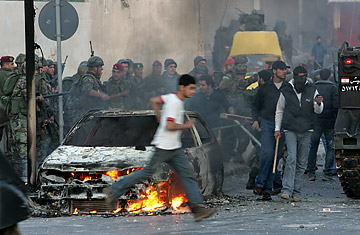
At least four people were killed and many were injured after a fight at Beirut's Arab University escalated into clashes between pro-government loyalists and anti-government opposition members.
Lebanon's political crisis has slowly intensified since last December when the Hizballah-led opposition launched its campaign to unseat the Western-backed government of Prime Minister Fouad Siniora. A general strike earlier in the week had turned violent, with rival Christian factions battling north of Beirut, while Sunni government supporters and Shi'ite partisans of the opposition fought each other with stones and clubs.
But Thursday's campus violence was the first spontaneous outburst unprompted by political leaders — and that underlined just how poisonous relations between Lebanon's Sunnis and Shi'ites have become.
It was not always so: Indeed, the Sunni-Shi'ite hostility in Lebanon is a new phenomenon, now overshadowing the more traditional Christian-Muslim divide. When Lebanon gained independence from France in 1943, the Shi'ites were confined mainly to the impoverished rural south and east, politically and economically marginalized by the Christian and Sunni elite in the coastal cities and ruled over by a handful of feudal landlords.
In the 1970s, rural poverty and incessant cross-border hostilities between Israel and Palestinian militants operating from south Lebanon spurred tens of thousands of Shi'ites to migrate to the slums of southern Beirut, dubbed the "belt of misery," bringing them into contact with the city-dwelling Sunnis.
Imam Musa Sadr, a charismatic Iranian cleric, led the political mobilization of the Shi'ite community in the 1960s and 1970s, giving it a voice for the first time through his Amal (Arabic for "hope") movement. Hizballah was born with Iranian assistance in the early 1980s, to resist Israel's occupation of Lebanon. And by the 1990s, the dynamism of Hizballah and the demographic advantage of the Shi'ites had begun to eat away at the historical Sunni dominance of Lebanon's Muslim communities.
Although that shift had generated a sense of unease among Lebanese Sunnis, the recent explosion of sectarian hostilities was triggered by a growing political confrontation during the past two years. Generally, Hizballah and its mainly pro-Syrian allies seek to wrest Lebanon away from the orbit of the United States and keep it at the forefront of the struggle against Israel. The anti-Syrian parliamentary majority, which forms the backbone of the government and includes the Sunnis, has seized upon the support of the West and its Arab allies such as Saudi Arabia to break Syria's grip on Lebanon. Damascus was forced to withdraw its troops from Lebnaon following the February 2005 assassination of Rafik Hariri, a former premier, whose death many Lebanese blame on the Syrian regime.
Lebanon's political fault lines today tend to follow sectarian boundaries, with the Shi'ites overwhelmingly following the Hizballah-led opposition, while the majority of Sunnis back the government and the Future Tide movement of Saad Hariri, Rafik's son and political heir. The tension between the two camps also mirrors the broader Shi'ite-Sunni political rift throughout the Arab world that has been rekindled by the Iraq conflict. The chief protagonists in this new "cold war," as some analysts describe it, are Shi'ite Iran and Saudi Arabia, the leader of the Sunni Arab world.
Hizballah's leaders have long spoken out against a schism between Shi'ites and Sunnis, arguing that it only benefits Israel and the enemies of Islam. And one reason it called off its general strike earlier this week was that Hizballah has probably concluded that the government, buoyed by roughly equal support to that of the opposition and backed by the weight of the international community, will not buckle regardless of any new measures undertaken by the opposition. That was implicitly acknowledged to TIME by Qassem Hashem, an opposition parliamentarian and member of the Lebanese branch of the Ba'ath Party. "The opposition is sensitive to the political tensions in Lebanon and has decided to stop its actions to give time for international and Arab mediation," he said.
Stepped-up diplomatic contact between Iran and the Saudis has also fueled considerable speculation that a face-saving compromise may be in the works end the political crisis in Lebanon. But as Thursday's unscripted surge of sectarian violence demonstrated, a political deal may come too late to cool the seething passions on the streets of Beirut.
